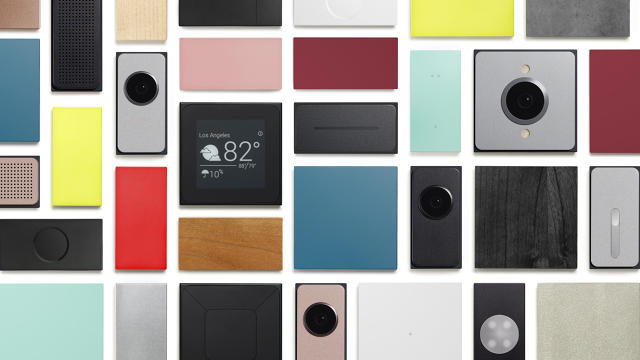RIP Project Ara.
Reuters reports that Google has killed Project Ara, ambitious project to build fully modular smartphones with interchangeable components. According to the report, Project Ara—which Google was showing off as recently as May at its annual I/O conference—was killed as part of a larger effort to consolidate the company's many different hardware projects. Still, the writing, retrospect, was on the wall.
Ara emerged out of Google's Advanced Technology and Products group (ATAP) in October 2013, but its launch was delayed in late 2015 when it was discovered that the modular smartphones were breaking apart when dropped, pushing back the release date until 2016.

In May, after announcing that developer units would go on sale in autmn, the Project Ara team told me they were refocusing Project Ara from a fully upgradeable smartphone to a framework for fringe features. In other words, Google's "fully upgradeable" smartphone wouldn't allow users to upgrade to a faster CPU, add more memory, replace the screen, or add a faster cellular modem, as it once claimed. Instead, customers would be limited to adding extraneous bells-and-whistles to their smartphones, like e-ink displays, better speakers, larger batteries, and other lesser features which, frankly, third-party accessories can already add to smartphones without needing modularity.
Without being able to upgrade the core components, though, the promise of Project Ara—a forever smartphone that you upgrade piece-by-piece—falls apart. Meanwhile, other Android smartphones like the LG G5 and Moto Z have been released this year with modular capabilities. They weren't as ambitious as Project Ara, but the fact that these phones haven't really moved the needle in the smartphone market couldn't have made Google feel better about keeping Project Ara going.

It's disappointing, but unsurprising. Project Ara was born out of Phonebloks, a Lego-like concept for smartphones by Dutch designer Dave Hakkens back in September 2013. At the time, I laid out the many reasons why a modular smartphone didn't really make sense, including the fact that the components would be much more expensive, likely to break, and power-hungry than their integrated equivalents. I described it as a "designer's dream and an engineer's nightmare." Three years later, it looks like Google is finally forcing Project Ara to wake up from that nightmare and move on.
Gadi Amit, president and principal of New Deal Design, was involved with Project Ara from the start and helped design its grid-like endoskeleton. "I'm very sad the project is closed. The ATAP team that led the project at the start was amazing and visionary (Paul Eremenko and Regina Dugan), and in retrospect, the project did have an impact in making modularity and user choice come to the forefront of the mobile industry," Amit writes. (For example, in the aforementioned LG G5 and Moto Z phones.) Sadly, Amit thinks that the death of Ara will effectively kill truly modular smartphones, at least for the foreseeable future. "I think modularity at the level Ara [tried to achieve] is too complex for anyone but Google or Apple to develop... and therefore, probably dead for now."
I'm also sad to see Project Ara go. I never believed it would work, but I wanted to be proven wrong, especially after meeting with the talented ATAP team at Google I/O 2016. They got me excited about Project Ara's accessibility features: the possibility of a diabetic being able to monitor their blood sugar with their smartphone, or a blind person snapping a braille reader to the back, seemed a lot more useful to me than a bunch of bleeding-edge tech nerds upgrading their smartphone CPUs every few months. That seems to me the real loss in Project Ara's death: the possibility it it could make smartphones truly personal—and thus, more usable—for millions of people with chronic conditions and disabilities around the world. RIP Ara.
We have reached out to Google and several other people involved in Project Ara for comment. We will update this story when we hear back.
[All Photos: Google/Project Ara]